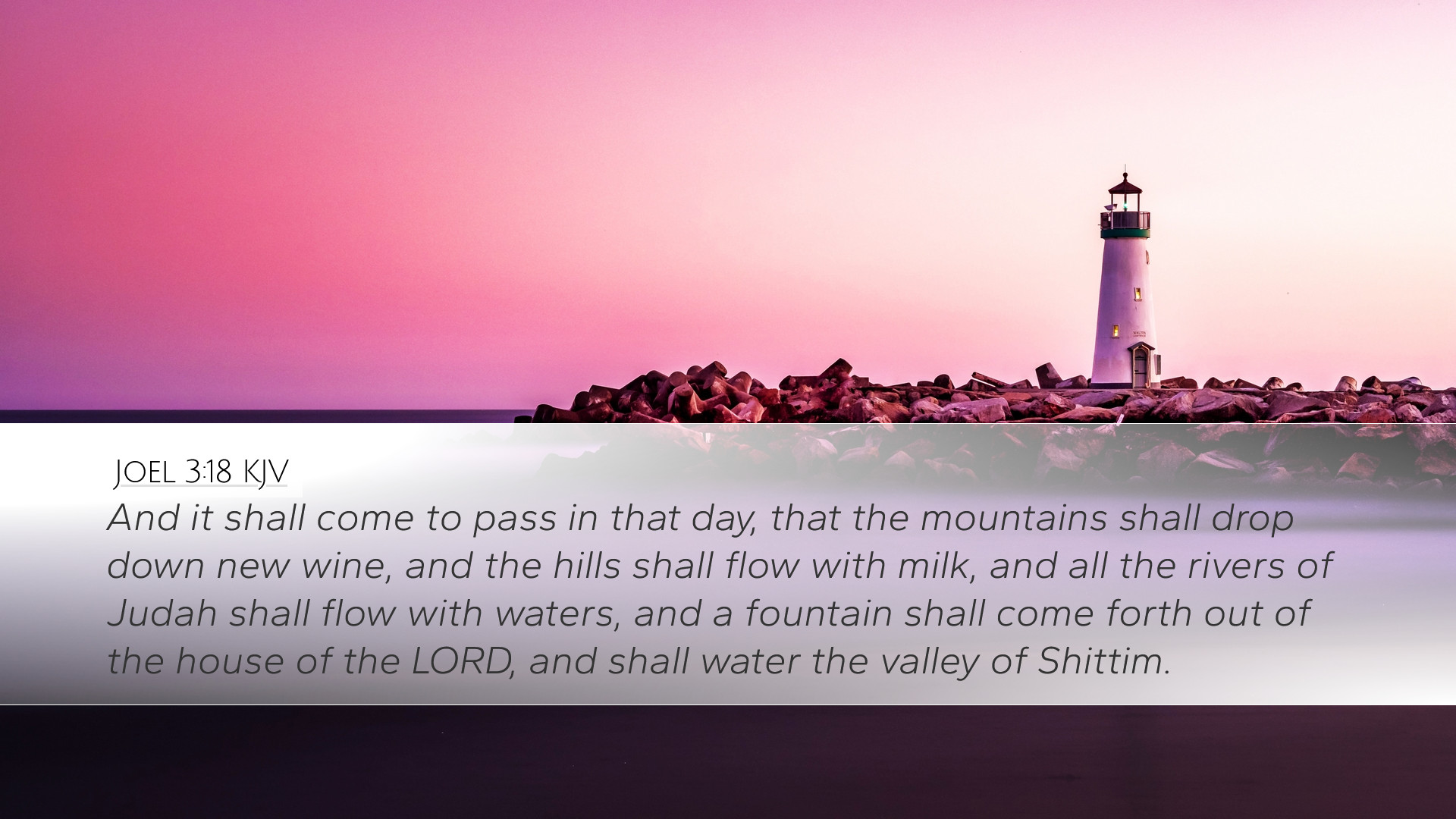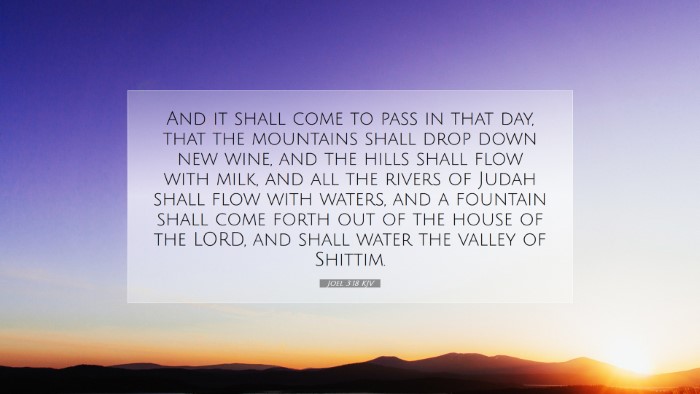Old Testament
Genesis Exodus Leviticus Numbers Deuteronomy Joshua Judges Ruth 1 Samuel 2 Samuel 1 Kings 2 Kings 1 Chronicles 2 Chronicles Ezra Nehemiah Esther Job Psalms Proverbs Ecclesiastes Song of Solomon Isaiah Jeremiah Lamentations Ezekiel Daniel Hosea Joel Amos Obadiah Jonah Micah Nahum Habakkuk Zephaniah Haggai Zechariah MalachiJoel 3:18
Joel 3:18 KJV
And it shall come to pass in that day, that the mountains shall drop down new wine, and the hills shall flow with milk, and all the rivers of Judah shall flow with waters, and a fountain shall come forth out of the house of the LORD, and shall water the valley of Shittim.
Joel 3:18 Bible Commentary
Commentary on Joel 3:18
Verse: “And it shall come to pass in that day, that the mountains shall drop down new wine, and the hills shall flow with milk, and all the rivers of Judah shall flow with waters, and a fountain shall come forth of the house of the Lord, and shall water the valley of Shittim.” (Joel 3:18)
Contextual Overview
The book of Joel is a prophetic work that portrays the day of the Lord, emphasizing themes of judgment and restoration. This particular verse encapsulates the hope that follows God's judgment—an era characterized by abundance and divine blessing. Joel's prophecy speaks uniquely to the people of Judah but also foreshadows a larger, universal hope for God's people.
Commentary Insights
In examining Joel 3:18, we can draw upon the insights of notable public domain commentaries:
-
Matthew Henry:
Henry emphasizes the rich imagery in this verse, noting that it's a depiction of the blessings that will flow from God once His people repent. The description of natural abundance represents both physical and spiritual blessings. The mountains dropping new wine symbolizes joy and celebration, while milk signifies nourishment and health. Henry posits that the river’s imagery signifies rejuvenation, hinting at the life-giving presence of God dwelling among His people.
-
Albert Barnes:
Barnes expounds on the eschatological implications of this verse. He identifies the day referenced here as not only a specific time of judgment but also a future hope where God’s people would experience unparalleled prosperity and blessing. He asserts that the fountain from the house of the Lord indicates the source of all blessings that comes directly from God’s presence. It draws a connection to the spiritual renewal that stems from God’s indwelling spirit in the believer’s life.
-
Adam Clarke:
Clarke provides a more detailed analysis of the geographical and agricultural references in Joel’s prophecy. He notes that Shittim, known for its acacia trees, highlights God's restoration of the land's fertility. This land, plagued by locusts in earlier chapters, will transform into a scene of bounty. Clarke underscores the significance of such transformations, suggesting a restoration not only in material wealth but also in spiritual stature as the people of God turn their hearts back to Him and experience His redemptive power.
Theological Implications
Joel 3:18 serves as a profound reminder of God’s faithfulness to His promises and the hope for restoration. Theological implications include:
- Divine Providence: This verse illustrates God’s control over creation. The abundance promised suggests God’s providential care and ability to transform the desolate into a place of blessing.
- Spiritual Restoration: The mention of “a fountain” pertains to the spiritual renewal that occurs when God’s presence actively dwells among His people. This points toward New Testament understandings of the Holy Spirit and the living water offered through Christ.
- Eschatological Promise: Joel’s prophecy resonates with apocalypse themes found throughout scripture. It serves as a proclamation of hope that transcends the immediate context, promising ultimate restoration for the people of God at the culmination of history.
Practical Applications
For pastors, students, theologians, and scholars, Joel 3:18 invites various practical applications:
- Encouragement in Despair: Pastors can draw on this verse to provide hope to congregants undergoing hardship, reminding them of the restorative power of God in their lives.
- Call to Repentance: The context demands a call to examine individual and corporate spiritual conditions. It teaches that true restoration follows genuine repentance.
- Celebration of God’s Abundance: The imagery of new wine and flowing milk encourages communities of faith to celebrate God’s provision and to anticipate His blessings.
Conclusion
Joel 3:18 stands as a beacon of hope, promising a day of unparalleled blessings from the Lord. By weaving together the commentary insights from Henry, Barnes, and Clarke, we unveil layers of meaning that enrich our understanding of God's heart for His people. Through this verse, scholars and ministers alike can draw encouragement, understanding, and a renewed vision of the future God has prepared for those who remain faithful.


